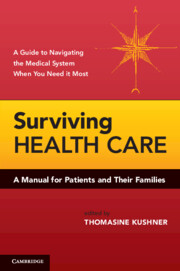Book contents
- Frontmatter
- Contents
- Contributors
- Preface
- 1 Letter to Patients
- 2 Becoming an Active Member of Your Health Care Team
- 3 Information That Will Help You with Advance Planning for Your Health Care
- 4 Responding to Medical Emergencies
- 5 What You Need to Know about Medical Errors
- 6 Being Informed When You Give Consent to Medical Care
- 7 Beware of Scorecards
- 8 Transplantation 101
- 9 When the Illness Is Psychiatric
- 10 On the Horizon
- 11 To Be or Not to Be – A Research Subject
- 12 Information That Will Help You Make Health Care Decisions for Adult Family Members
- 13 Caring for Individuals with Alzheimer's Disease
- 14 When the Patient Is a Child
- 15 Care of Elders
- 16 Being and Thinking
- 17 A Patient's Guide to Pain Management
- 18 The Hardest Decisions
- 19 What You Need to Know about Disasters
- 20 Making the Internet Work for You
- Appendix: Patient Individual Profile
- Index
- References
20 - Making the Internet Work for You
Researching Your Health Questions
Published online by Cambridge University Press: 05 June 2012
- Frontmatter
- Contents
- Contributors
- Preface
- 1 Letter to Patients
- 2 Becoming an Active Member of Your Health Care Team
- 3 Information That Will Help You with Advance Planning for Your Health Care
- 4 Responding to Medical Emergencies
- 5 What You Need to Know about Medical Errors
- 6 Being Informed When You Give Consent to Medical Care
- 7 Beware of Scorecards
- 8 Transplantation 101
- 9 When the Illness Is Psychiatric
- 10 On the Horizon
- 11 To Be or Not to Be – A Research Subject
- 12 Information That Will Help You Make Health Care Decisions for Adult Family Members
- 13 Caring for Individuals with Alzheimer's Disease
- 14 When the Patient Is a Child
- 15 Care of Elders
- 16 Being and Thinking
- 17 A Patient's Guide to Pain Management
- 18 The Hardest Decisions
- 19 What You Need to Know about Disasters
- 20 Making the Internet Work for You
- Appendix: Patient Individual Profile
- Index
- References
Summary
Consumer health information is in great demand, and the widespread availability of such information has both positive and negative aspects.
Many types of information may be found on the Internet, ranging from condition-specific organizational websites, associations, and self-help groups, to organizational and commercial Web portals (“weblio graphies”) and freely available, up-to-date medical literature. The amount of health-related information on the Web is overwhelming, and if you wonder whether or not it is reliable, you're not alone. This chapter focuses on a few excellent health websites and on techniques for evaluating other health information sites you may find in your explorations.
Although the Internet is a significant resource for finding health information, it is very important to evaluate the information you read and/or use. Therefore, part of this chapter is devoted to skills for evaluating health-related websites. This chapter is not meant to be comprehensive. Indeed, with the overabundance of health websites aimed at consumers, it would be impossible to cover them all. However, it does point you toward good sites for answering many consumer health questions and should give you confidence in your ability to judge health information you encounter while searching for health information for yourself or others. Knowing where to look for information, and how to evaluate and interpret it, may allow you to take more control of your health.
The Pew Internet and American Life Project (Pew) provides a very interesting background on the use of the Internet for finding health information.
Keywords
- Type
- Chapter
- Information
- Surviving Health CareA Manual for Patients and Their Families, pp. 294 - 310Publisher: Cambridge University PressPrint publication year: 2010

